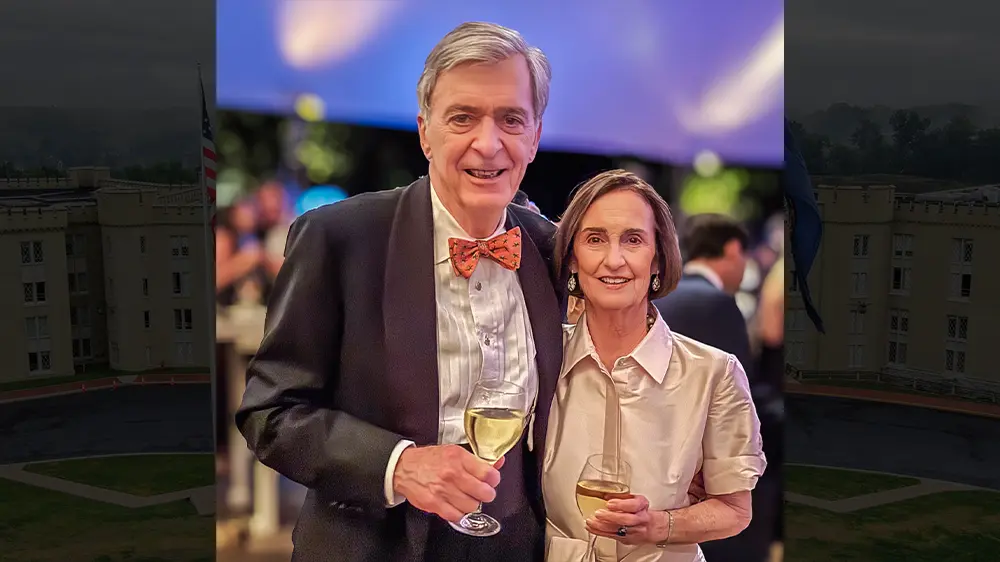Q&A: Hines ’66

Richard Hines ’66, a fourth-generation VMI alumnus, chaired the VMI Board of Visitors Commemorations and Memorials Naming and Review Committee.

Richard Hines ’66, a fourth-generation VMI alumnus, chaired the VMI Board of Visitors Commemorations and Memorials Naming and Review Committee.
Now recently retired after a 52-year career as an attorney that culminated with a position as senior litigation partner with Nelson Mullins Riley & Scarborough in Atlanta, Georgia, Richard Hines ’66 matriculated from Lookout Mountain, Tennessee, with his twin brother, Edwin Hines ’66, as part of a four-generation VMI legacy family. He earned a Bachelor of Arts degree in English from VMI and served in the U.S. Army (armor) before going on to earn a Juris Doctor degree from the Vanderbilt University School of Law. Hines served on the VMI Foundation Board of Trustees from 2011–14 and the VMI Board of Visitors from 2014–22.
Q: How did your extended family shape your path to VMI?
A: “My great-great-uncle, James Watson, [Class of 1868] arrived 2 weeks after the Battle of New Market. He was at VMI when [Union Gen. George] Hunter shelled and burned the Institute and spent the rest of the war years in Richmond with the Corps. My great-grandfather, Edward Watson [Class of 1871] was his younger brother. This was on my grandmother’s side. My grandfather Hines was a member of the Class of 1894, and my father was Class of 1926. And, interestingly enough, all those family members were lawyers. It was through those that I had a family tradition of simply, ‘Yes, Richard, you and your twin brother, Edwin, will attend Virginia Military Institute upon graduation from high school—period, no further discussion!’”
Q: How did your cadetship influence the path you took after VMI graduation?
A: “I always thought that I would study liberal arts and then would go to law school. In my rat year, we had some sort of aptitude test that was given to all the rats. Shortly afterwards, Colonel [Herbert Nash] Dillard [Class of 1934] saw me after English class and, in his usual larger-than-life manner, said, ‘Mister Hines, the only education offered at Virginia Military Institute is that of the English major!’ He later drove me to Lynchburg one night to watch Dame Judith Anderson perform in Euripides’ play, ‘Medea,’ to prove his point.
“When you think about ’64, ’65, ’66, you think about the beginning of the Vietnam War, and there was a sense at VMI that you needed to serve your country. You needed to prevent the dominoes from falling in the Far East. And I decided that rather than doing what I thought I was going to do, which was to apply to law school, it was time for me to serve and to go into the military.”
Q: What lessons learned at VMI have remained with you over the course of your lifetime?
A: “First, and viscerally, time management. There is not a day that goes by that I don’t think what do I need to do, and how do I get that done in the time that is allotted to get it done? I was a trial lawyer. We always had deadlines, and we always had to plan in advance to meet those deadlines. And VMI absolutely taught me time management. Next, and more critically, there’s character and integrity. Your word is your bond in the legal profession—or any profession, whether military or civilian. Your reputation is forever lost if you are not true to your word, and the VMI honor system drilled that lesson into me. Then there’s leadership. VMI teaches everyone when you are confronted by a problem, your first response is not to run away, but rather to fix it and lead through this.”
Q: You have given back to VMI in terms of time, talent, and treasure, even as you were immersed in a very demanding profession. Why did you choose to do so?
A: “My twin, Edwin, had been very successful in the bond business. He was invited to participate in the Foundation’s Investment Committee, and he was serving on that committee when he died of cancer in 2010. That opened the door for me to be invited to get involved as a trustee on the Foundation Board, which was instrumental in teaching me how the Foundation operates, where the money to run VMI comes from, and how important it is to give to VMI.
“[On the Board of Visitors], I was appointed to chair the Commemorations and Memorials Naming and Review Committee. Our challenge was to review the Confederate iconography on post and ensure that the [post] was inviting and inspiring without erasing its past—something that was happening throughout the country at the time. We had to satisfy the direction being given in Richmond, and we had to respond to the state-ordered investigation. Without compromising our complex history, I think the committee—which was comprised of board members, alumni, Civil War historians, faculty members, and the Regimental S5—ultimately came to the perfect solution to make VMI an inviting and inspiring post for all, including the young high school senior who knows nothing about VMI. I would just like to congratulate the work the board did during those unsettling times between the transition from General Peay’s leadership [VMI’s 14th superintendent] on the one hand to the leadership of General Wins [VMI’s 15th superintendent] on the other. Those were remarkable times, and I think VMI came out wonderfully in the end.”
Q: You are a supporter of the Peay Endowment. Why is that fund important to you?
A: “Education is what VMI is all about. Scholarship is what VMI is all about. And the Peay Endowment speaks to that in spades. The Peay Foundation addresses [faculty salaries] specifically by being able to name individual professors with a chair that then frees up funds to be spread among the faculty in general. And it’s also critically important to be able to induce more VMI graduates to think about going into the teaching profession and then coming back to VMI as a professor.
“I think the VMI professor who has been through everything that 4 years of cadet life entails better appreciates the day of a cadet that somehow compresses a 50-hour day into 24 hours and, as a result, is better for it.”
Q: If any alumni or friends of VMI asked you why he or she should serve VMI or give to it, how would you answer them?
A: “Isn’t service the very thing that VMI teaches you? Isn’t that the essence of [VMI founder J.T.L.] Preston’s inscription on the parapet? We who give of our time and treasure do so to preserve that which makes VMI the unique life-preparing institution that it is. We graduate leaders of character for the 21st century, and we need to ensure that that goal isn’t just aspirational but rather reflects reality.”
Q: If I haven’t touched on something you’d like to address, you have the last word.
A: “As a fourth-generation graduate, I have talked about the value of VMI. But I would suggest that today’s graduates, male or female, who may be the first in their family to graduate from college, can say it much better than I have here woefully attempted.”

The development writer plays a key role in producing advancement communications. This role imagines, creates, and produces a variety of written communication to inspire donors to make gifts benefiting VMI. Utilizing journalistic features and storytelling, the development writer will produce content for areas such as Annual Giving, stewardship, and gift planning.